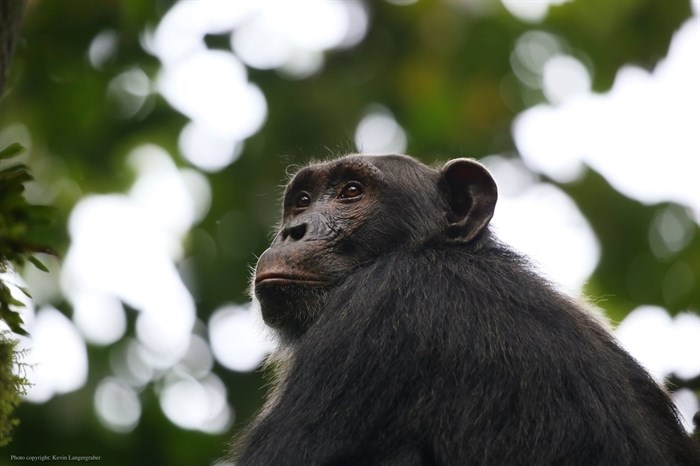
One of the chimps from the Ngogo Chimpanzee Project Inc.
Image Credit: SUBMITTED/ Ngogo Chimpanzee Project Inc.
August 10, 2019 - 12:31 PM
KELOWNA - Kevin Langergraber had no idea he’d be spending his summers in a Ugandan forest observing the social order of chimps when he was graduating from Mount Boucherie seconday school decades ago.
Psychology coursework from his days at Okanagan University College, however, set him on that path and now, as an anthropologist for Arizona State University, he has travelled to Ngogo, in Uganda’s Kibale National Park for 19 years, each summer embedding himself in a community of chimpanzees for two-and-a-half months.
“I’m incredibly lucky to come here and study these animals,” he said, from the national park he works in every year.
“I’ve seen young (chimpanzee) kids grow up to be strapping adult males and the prime adult males are the old men of the community.”
Some of the females are as old as 70.
Each year when he leaves, Langergraber worries it will be the last time he sees these creatures who humans are so closely related to.
In their habitat in the forests of central Africa, chimpanzees spend most of their days in the tree tops. When they come down, chimps usually travel on all fours, though they can walk on their legs like humans for as far as a mile. They use sticks to fish termites out of mounds and bunches of leaves to sop up drinking water.
Chimpanzees are our closest cousins and we share about 98 per cent of our genes and many social behaviours, raising families and staying together as units.
“Humans are similar to chimpanzees and different from other animals… among other things, you have nuclear families, and multiple nuclear families make up a band, and they travel together,” he said. “Multiple bands with other higher levels of organizing make up a clan.”
It’s not just old age that’s chipping away at the population of chimps that Langergraber has come to know so well.
For all the similarities between our species, their challenges are more lethal.
Chimpanzees are an endangered species, with the World Wildlife Fund pegging their population at 172,700 to 299,700.
The illegal wildlife trade, destruction of habitat and poaching are the biggest threats to chimpanzees.
Langergraber is all too aware of these threats having witnessed them play out over the years, but said in Ngogo things are a little different.
“In the 1930s people lived in this park, but were kicked out when it became a national park,” he said.
The space of Kibale is limited to 800 square kilometres, and there’s a stigma against eating primate meat in Ugandan communities, though that’s not to say it doesn’t happen at all. Trappers set out to get other wildlife, like boars and antelope, but there are times chimpanzees get caught in their snares.
Incidents of chimps losing their feet in traps aren’t uncommon, and one-third of Ngogo’s chimps have suffered some snare related injury.
Some simply don’t survive.
In some cases, poachers may just kill the chimp, and smoke the meat and mix it in with boar, and sell it. Or sometimes they just cast the dead creature aside.
And there are some cases of poaching.
“An important thing to know is that hunting chimpanzees, it’s not subsistence hunting in Kibale, like other parts of Africa,” said Langergraber. “It’s a small forest surrounded by hundreds of thousands of people… it wouldn’t sustain them to hunt (primates). It’s rich people who can afford this.”
The Uganda Wildlife Authority is trying to stop illegal activity in the park and Kibale now has three anti-poaching teams.
“We work with them, we have three teams of local people who assist Uganda wildlife authority with anti-poaching activities.”
Much of the work they do, however, has more to do with the study of chimpanzees’ social hierarchy, which is also unique due to the protected nature of the forest.
Even without human influence, there would be violence and in recent years Langergraber has witnessed the use of lethal force among the camp of 200 chimps.
A civil war is building and chimps that once lived together in peace are becoming enemies.
It may be comfort of the protected space that caused the social change.
“More food may have created the ability for chimps to not leave their neighbourhoods,” he said.
Once the two groups of chimps would have been a bit more migratory, travelling for food.

Kevin Langergraber
Image Credit: SUBMITTED
They would have run across families from different areas on those travels more regularly, now with relative abundance they’ve settled in and don’t have to leave the neighbourhood. They would grow stronger social bonds with the chimps closer to them and that may set the stage for the aggression toward others they don't see as often.
It's all an evolving understanding of the creatures with whom people share so many commonalities. And for all his growing knowledge of specific chimps, how they work together and their comings and goings, Langerberger admits there are limitaitons.
"We (scientists who go each year) do what we do and talk about them. We can see one and say, 'I think so and so is moving up in the hierarchy and recruiting another guy to overthrow that guy' and we see friendships and social relationships, but it's a bit like watching a soap opera," he said. "I'm more immersed in their lives and our goal is to not be involved, we want them to ignore us and they can and go about their normal lives."
Allowing that to happen for the long term may be challenging, but the organization he works with is doing its best to ensure the species is around for years to come.
To learn more, go here.
To contact a reporter for this story, email Kathy Michaels or call 250-718-0428 or email the editor. You can also submit photos, videos or news tips to the newsroom and be entered to win a monthly prize draw.
We welcome your comments and opinions on our stories but play nice. We won't censor or delete comments unless they contain off-topic statements or links, unnecessary vulgarity, false facts, spam or obviously fake profiles. If you have any concerns about what you see in comments, email the editor in the link above.
News from © iNFOnews, 2019